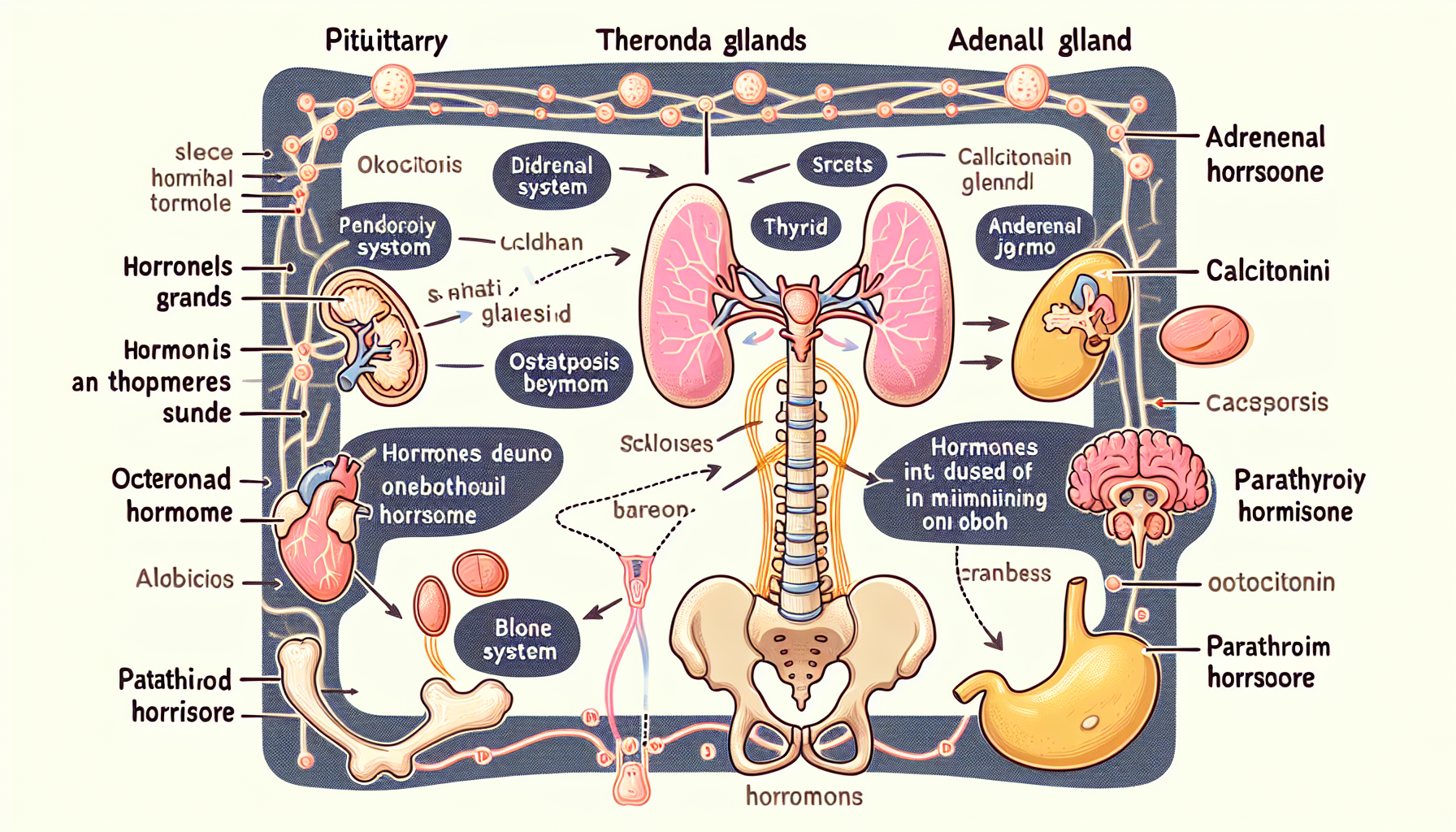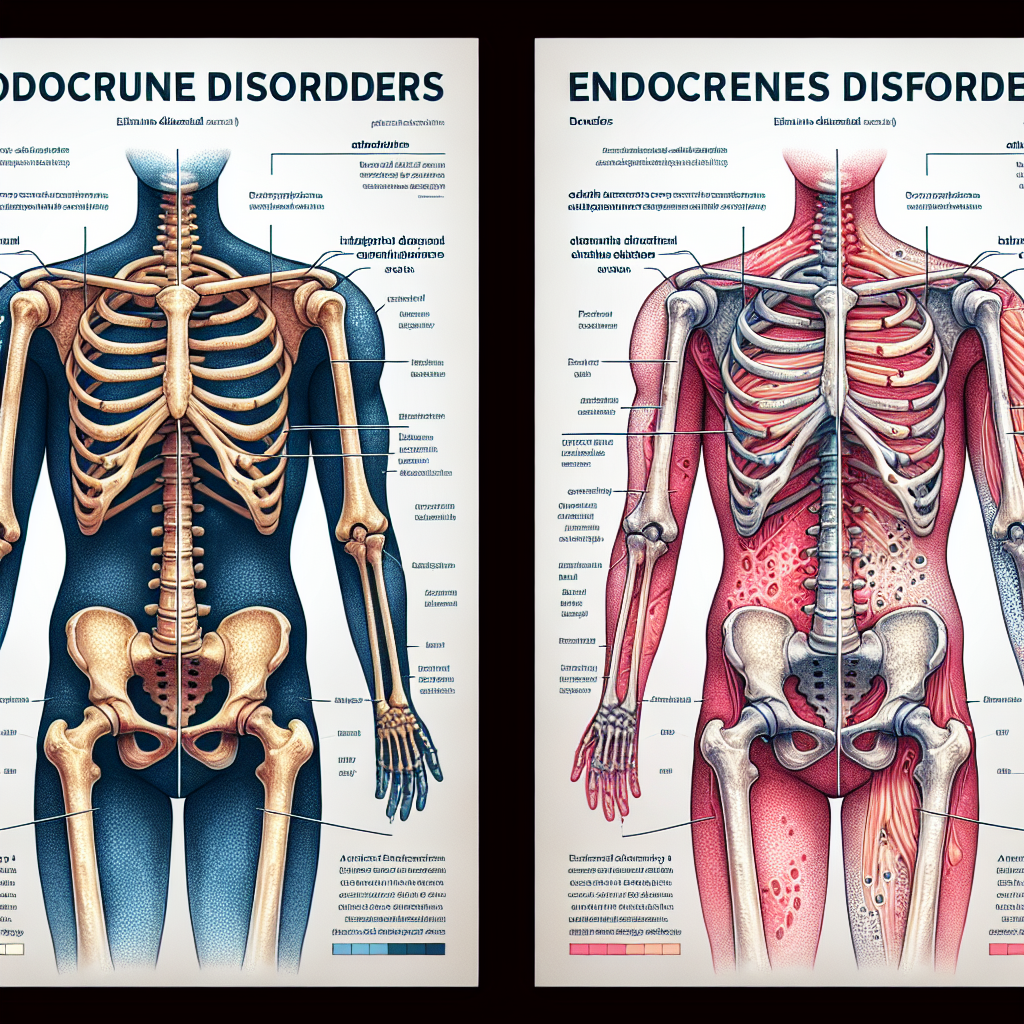Bone health is a critical aspect of overall wellness, and the intricate balance of nutrients, hormones, and physiological processes that maintain it is a testament to the complexity of the human body. Among the many factors influencing bone mass, endocrine disorders play a significant role, often leading to changes that can compromise the integrity of the skeletal system. This article delves into how such disorders affect bone mass, explores preventative strategies, and highlights the importance of understanding the body’s endocrine functions in maintaining bone health.
The Function of the Endocrine System in Bone Health
The endocrine system is a network of glands that produce and release hormones directly into the bloodstream. These hormones regulate various bodily functions, including growth, metabolism, and reproduction. When it comes to bone health, several key hormones contribute to the regulation of bone metabolism and the maintenance of bone density, such as parathyroid hormone, calcitonin, and sex hormones like estrogen and testosterone.
Parathyroid Hormone and Bone Remodeling
Parathyroid hormone (PTH) plays a vital role in calcium regulation and bone turnover. It stimulates the release of calcium from bones into the bloodstream and enhances the absorption of calcium in the kidneys and intestines. In physiological amounts, PTH contributes to bone remodeling—a process where old bone tissue is replaced by new bone tissue. However, excessive PTH secretion, often due to hyperparathyroidism, can lead to the weakening of bones and increased risk of fractures.
Calcitonin’s Role in Bone Preservation
Calcitonin, produced by the thyroid gland, counterbalances the effects of PTH. This hormone helps lower blood calcium levels by inhibiting the activity of osteoclasts—cells responsible for bone resorption. By doing so, calcitonin aids in preserving bone mass. A deficiency or imbalance in this hormone can lead to bone loss and contribute to conditions like osteoporosis.
Influence of Sex Hormones
Estrogen and testosterone are crucial for maintaining bone density. Estrogen helps prevent excessive bone breakdown, while testosterone promotes bone formation. A decline in these hormones, particularly during menopause in women, can lead to a rapid decrease in bone density, consequently increasing the risk of developing osteoporosis.
Endocrine Disorders and Their Impact on Bone Mass
Endocrine disorders can significantly affect bone health. Diseases such as diabetes mellitus, hyperthyroidism, Cushing’s syndrome, and growth hormone imbalances can all lead to alterations in bone mass and quality.
Diabetes and Bone Quality
Diabetes can affect bone health in several ways, particularly through the impact of advanced glycation end products (AGEs) on collagen within the bone matrix, potentially altering bone quality and increasing fragility. This highlights the need for comprehensive management of diabetes to prevent complications related to bone health. For further insights on managing diabetes and its effects on the skeletal system, The Role of Exercise in Preventing Bone Loss provides valuable information.
Hyperthyroidism and Bone Turnover
Excessive thyroid hormone production increases the rate of bone turnover, leading to a loss in bone density. Addressing hyperthyroidism is essential for preserving bone mass. To explore the role of thyroid hormones in bone metabolism, readers may find Understanding the Link Between Collagen and Joint Health to be a helpful resource.
Cushing’s Syndrome and Osteoporosis
Cushing’s syndrome, characterized by high levels of cortisol, often results in bone loss and an increased risk of fractures. Cortisol has catabolic effects on bone tissue, promoting resorption and impairing new bone formation.
Growth Hormone Imbalances
Both excess and deficiency in growth hormone can affect bone density. Acromegaly, caused by too much growth hormone, may lead to an increase in bone size but not necessarily strength, while a deficiency can lead to lower peak bone mass.
Strategies for Bone Health Management
Considering the impact of endocrine disorders on bone health, proactive management strategies are crucial. These include:
Monitoring and Medication
Regular monitoring of hormone levels and the use of medications can help manage endocrine disorders effectively. For instance, bisphosphonates are often prescribed to prevent bone loss in individuals with osteoporosis.
Nutritional Support
Adequate intake of calcium and vitamin D is essential for bone health. For specific dietary advice, Calcium-Rich Foods for Optimal Bone Health offers practical tips on nutrition.
Exercise
Physical activity, especially weight-bearing and strength-training exercises, can help maintain and improve bone density. Engaging in regular exercise is a key strategy for preventing bone loss.
Lifestyle Modifications
Smoking cessation and limiting alcohol consumption can help minimize bone loss. Additionally, fall prevention strategies are important to reduce fracture risk, particularly in the elderly or those with weakened bones.
Conclusion
Bone health is intricately connected to the endocrine system, and endocrine disorders can pose significant risks to bone integrity. Understanding these relationships is paramount for preventive care and management. By combining medical treatment with lifestyle and dietary strategies, individuals can mitigate the effects of these disorders and maintain stronger bones throughout their lives.
For further reading on the topic of bone health, consider visiting Bone Health on the Avix Health website, which provides a wealth of information on maintaining a healthy skeletal system.
Readers looking to deepen their understanding of the subject can find additional niche and specific resources through these external links:
- National Institute of Arthritis and Musculoskeletal and Skin Diseases – Information on bone health from a leading research institution.
- The Endocrine Society – Clinical practice guidelines and patient education on endocrine disorders.
- International Osteoporosis Foundation – Resources and support for individuals dealing with bone health issues.
- National Osteoporosis Foundation – Tools and information for preventing and managing osteoporosis.
- American Association of Clinical Endocrinologists – Education and advocacy on endocrine health issues.
By staying informed and proactive, we can work towards better bone health and a stronger foundation for our bodies.



